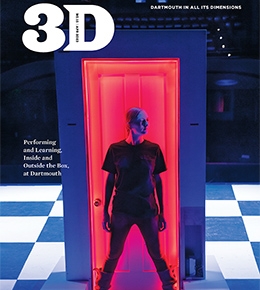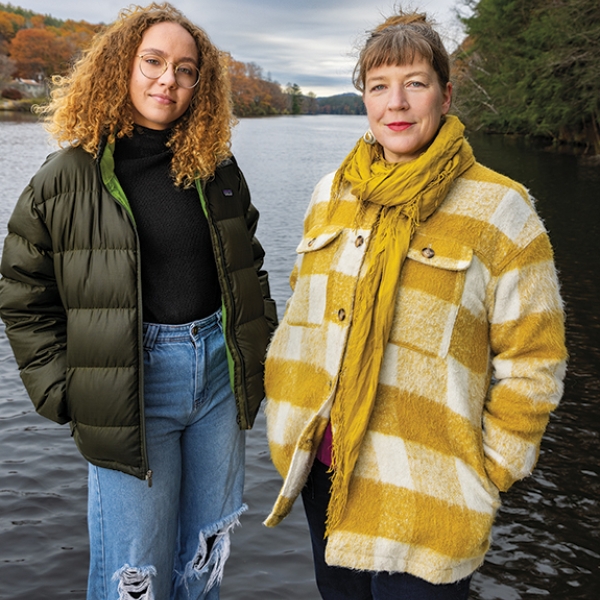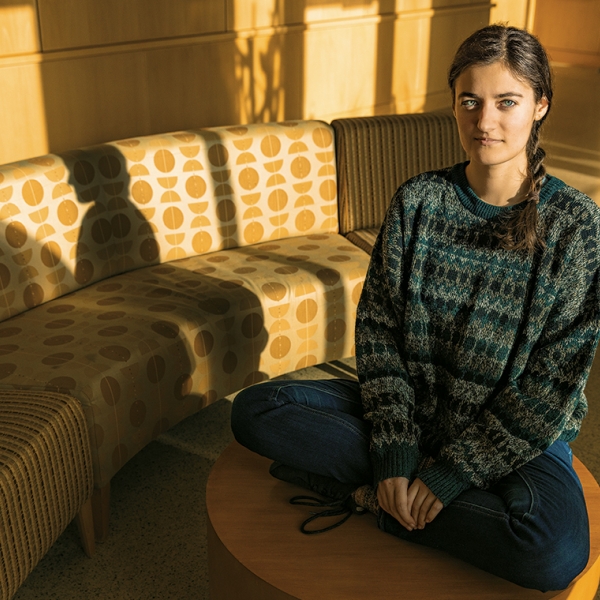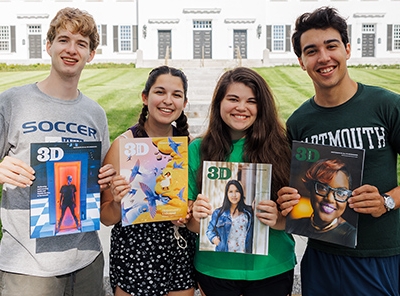Meet Dartmouth's 19th President

On July 1, Dartmouth will welcome Sian Leah Beilock as its 19th president. The current president of Barnard College, she is a leading cognitive scientist who studies how people perform under pressure. The first woman to be elected president in the 253-year history of Dartmouth, Beilock recently sat down with 3D for a wide-ranging interview. What follows are excerpts from that conversation. (Editor's Note: Questions and answers have been edited, including for space and style.)
ESTELLE STEDMAN: If the high school students reading this interview were to attend Dartmouth, they would do so during the early years of your presidency. What should they know about you?
PRESIDENT-ELECT SIAN LEAH BEILOCK: First, I would want them to know that I am excited about being around young people who challenge ideas and viewpoints. That is something Dartmouth embodies wholeheartedly. And I hope they'd be excited about being around really great minds —other students, faculty, staff and alums—and getting equipped with the tools to go out and change the world.
ES: Drawing on your experience as a university leader—and, in particular, on your research on young people and stress—what advice would you give high school seniors with some big decisions to make this spring?
SLB: Be compassionate with yourself. We high achievers tend to be really hard on ourselves. Psychologists talk about "self-compassion," this idea that we should give ourselves a break. That the decisions we make, we will find a way to make them work for us. And oftentimes the things you'd say to be supportive of a friend or family member, we need to say to ourselves, too. And the way we talk to ourselves—we'd never be that mean to someone else. And so, it's really important to practice self-compassion.
ES: High school juniors are beginning to make college lists, or at least beginning the research that informs the making of those lists. What advice do you have for them?
SLB: You're trying to learn about the DNA of a place. How people are with each other. How students are with each other. How students and faculty are with each other. And what I think is so special about Dartmouth is that undergraduates are wholly taught by faculty, not just taught by faculty in the classroom. They go to lunch with faculty, they work in their labs, and those
faculty become mentors forever.
ES: You yourself are the mother of a daughter who's currently 11 years old. As a parent, what advice would you give parents and other adults?
SLB: It's always important to let your student drive the admissions process, and to be there as a supporter and a questioner and a cheerleader. This is really one of the first times students are making their own decisions about what comes next. And, of course, they don't do that in a vacuum. For parents like me who want to be very involved, being a supportive voice and letting the student be out front and center is so important.
ES: You earned your bachelor's degree in cognitive science at the University of California, San Diego. What was it like for you to apply to college?
SLB: When I was in high school, I had no idea where I wanted to go to school, and I was really stressed by everyone around me who seemed to have it all figured out. But the truth is, no one has it figured out. The idea is to continue to get more information.
ES: How did you choose your major?
SLB: My first year in college, I probably considered six different majors. The beauty of a liberal arts education is that it exposes you to so many different ways of thinking and to different fields, and from there you get to choose what you'll pursue. But your major does not dictate your career path. At Dartmouth, English majors work at Google and chemistry majors end up in publishing. You're pursuing your passion as you're learning how to think. Not what to think, how to think. As an undergrad, I was excited that I could study myself and understand other people. And that's what led me into cognitive science. I do a lot of "me-search," not just research. I wanted to understand why I sometimes didn't perform at my best, especially when it mattered most.
ES: As a senior nearing the end of my time here, I am struck by how it's flown by. What advice do you have for making the most of the college experience?
SLB: Resist FOMO: Fear Of Missing Out. Especially coming out of the pandemic, it's important to be present. I would urge students to pick classes and extracurriculars in a way that gives them time just to be. And to think. We know from psychology that when those great ideas come, it's when you're stepping back. It's when you're not banging your head against the wall. Dartmouth does a really good job of creating opportunities for students to take that step back. But we could all do a little more of that.
ES: You are one of the world's experts in the brain science behind "choking under pressure." You have explored this subject in business, in education, in sports. Tell me about your book Choke: What the Secrets of the Brain Reveal About Getting it Right When You Have To, as well as your TED Talk. It has been viewed more than 2.5 million times, and one of those viewers was me.
SLB: Many of those views were my mother! Seriously, if you take anything away from my research, it's that how we think matters. And how we prepare matters. We tend to think about our psychological state as an afterthought, like, "We'll learn all the material and then we'll figure it out." But it turns out that how you feel, and how you prepare to be in a stressful situation, make the difference between whether you put your best foot forward or not. The idea is that you're not just preparing content or getting your body ready for a competition. You have to train your mind too. My research looks at how best to do that. So, for example, we know that when we walk into a high-stress situation, and we have sweaty palms and a beating heart, we tend to think, "Oh no, I'm about to fail." And just the act of interpreting our physiological response in that way changes how our brain functions, and it can actually lead to worse performance. But if we think, "Oh, this sweaty-palms-beating-heart is a sign that I'm ready to go," we tend to perform better. In fact, the heart is beating and shunting blood to your brain so you can think.
ES: Let's connect what you were discussing before, in terms of having self-compassion, to taking care of yourself in the college admission process. Many high school juniors may be feeling pressure to apply to a specific college or to colleges within a specific tier.
SLB: There are so many great institutions, so it goes back to keeping an open mind and understanding that even the thing you wanted the most may not actually be what is best for you. And understanding that after the fact. It's always helpful to do that exercise with yourself, because it's easier to say than do. Think back to any time where there was something you really wanted and maybe you didn't get it. How did things work out? What did you do? Generally, it tends to open up new doors.
ES: I love looking at that as a way of opening up the aperture instead of closing it.
SLB: And remember, even though everyone around you might seem like they have it figured out, they don't.
ES: I read something you said during your time at Barnard that I felt was particularly powerful: "It's important for young girls to view examples of women scientists. But instead of framing these careers as something they can be, let's show them science as something they can do." You also said that you "make a point of highlighting these women to my daughter throughout our daily lives." How does this vision connect to your research and to the work you're hoping to do at Dartmouth?
SLB: It's about changing the conversation about who goes where. As you're learning how to think, that allows you to go into any situation, a situation that you don't know about, and learn, and tackle problems and opportunities. And I love the fact that students at Dartmouth take so many different classes. Most students end up taking an engineering class at some point, Design Thinking, whether they're an engineer or not, and that students who are scientists take English and art history and have study-abroad experiences and get to see the world in different ways. All this is about doing. Whether you decide this certain field is for you or not, it gives you a sense of confidence that you can tackle anything.
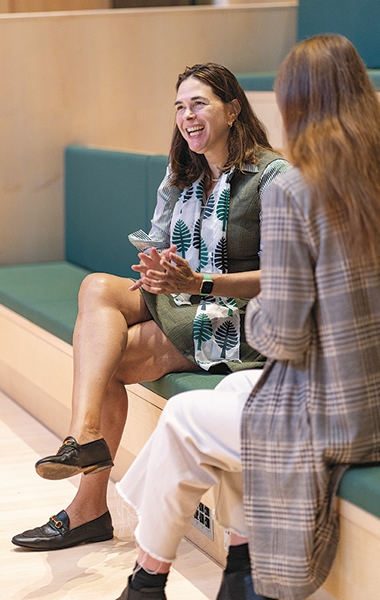
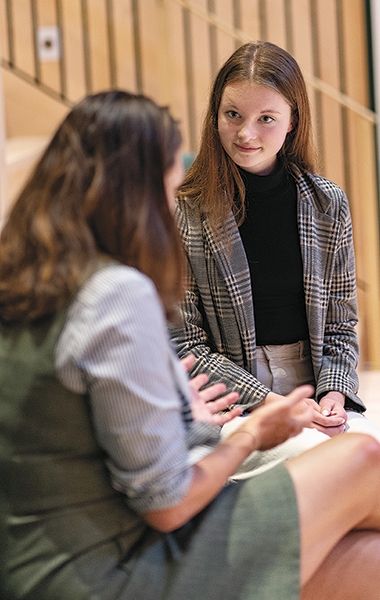
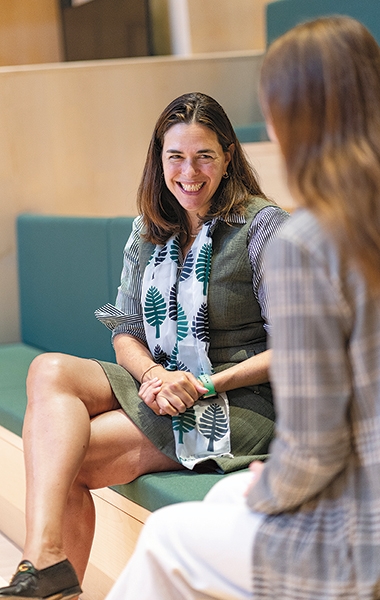
"You can't have academic excellence without a precursor of health and wellness. Which means health and wellness needs to be everywhere in the Dartmouth experience."
- President Sian Beilock
ES: Many 3D readers will have experienced—or are going to experience—the task of writing the classic "Why Dartmouth?" essay. You spent 12 years at the University of Chicago and you're currently at Barnard. Moving from New York City to Hanover is quite the leap, so, I'd love to know, in your words: Why Dartmouth?
SLB: I fell in love with what Dartmouth stands for. This model of higher education combines the best of an undergraduate education across the arts and sciences with great graduate and professional schools on campus, so Dartmouth creates this life of the mind that you don't see in many places. It's the best of all worlds. It's the secret Dartmouth sauce: as an undergrad, you get to interact with, spend time with, have breakfast with world-class faculty who are doing work that is changing the world. It sets up the standard for you to go out and do the same, and it gives you an unparalleled undergraduate experience in the world of higher education. Plus, I love the environment of Hanover. The community, the sense of outdoors, the sense of place—it's very clear that this is a place where people take care of and look out for one another.
ES: How do you feel about becoming the first female president of Dartmouth?
SLB: It's an honor. And it's a call to action. Dartmouth is such a storied, impressive institution, and like everything in our world today, it's time to take it to the next level.
ES: When you become president this summer, you'll be 47. How would you characterize the importance of being among a younger generation than many college presidents?
SLB: I'm a big fan of having different people with different lived experiences at the table for everything. Because the research is really clear: that leads to the best ideas. And I think that comes with generational diversity as well. I'm excited to be able to model that you can be a mother with young kids, and you can also be a president, you can be a scientist, and you can help use that to pull in the voices of the younger generation to make a place be successful.
ES: We are having this conversation on campus during a celebration of the 50th anniversary of coeducation at Dartmouth. It is also the 50th anniversary of the Black Alumni of Dartmouth Association as well as the department of Native American and Indigenous Studies. How do these anniversaries resonate with you?
SLB I really wanted to be on campus this weekend, because it sends a signal of the strength of an institution being built on the diversity and inclusion of different perspectives. Being a leader who's a woman is part of that. Just as coeducation and the anniversaries of these really important groups all make Dartmouth better. And so, it's a signal. It allows Dartmouth to thrive, and this work is not finished. We have to continue to be a place that educates and supports the best and brightest across differences. I see it as a celebration, a call to action. Especially celebrating the 50th anniversary of coeducation, it has been special hearing from women who were "firsts" and "onlies." It underscores that they did the work that allowed me to be here. Now it's my turn to do the work that will allow even more individuals and folks to thrive here at Dartmouth.
ES: One of your initiatives at Barnard is called "Feel Well, Do Well," which is focused on mental health and mindfulness. How might you bring elements of that important work to Dartmouth?
SLB: You can't have academic excellence without a precursor of health and wellness. Which means health and wellness needs to be everywhere in the Dartmouth experience. That allows you to be successful. It allows you to push. It allows you to get up from failure. I'm excited to learn more about the programs already in place and to continue to expand them. Dartmouth is a place that can be a leader in ensuring that our students come out not just with great academic training, and with a commitment to make the world better, but with the tools to be well and to take care of their own wellbeing in the many years to come.
Interview by Estelle Stedman '23 is an English major with a minor in Chinese language from Seattle, Washington.
Photographs by Tim Ryan Smith and Ulia Levine '23
A TED Talk Seen by Millions
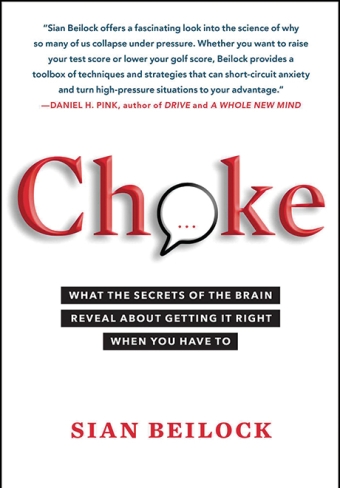
Choke: The Book
In her book Choke: What the Secrets of the Brain Reveal About Getting it Right When You Have To, Sian Beilock explores questions that are likely as mystifying as they are familiar to readers. What happens in our brains and bodies when we "crack under pressure?" Why do smart students often perform poorly on standardized tests? Why do we often "mess up" when the stakes are highest? And what steps we might to take to avoid choking?
Beilock draws on the breadth and depth of her work as an expert on performance and brain science, as well as first-hand experience. As the book's dust jacket puts it: "Whether you're at the Olympics, in the boardroom or taking the SAT, Beilock's clear, prescriptive guidance shows how to remain cool under pressure."
